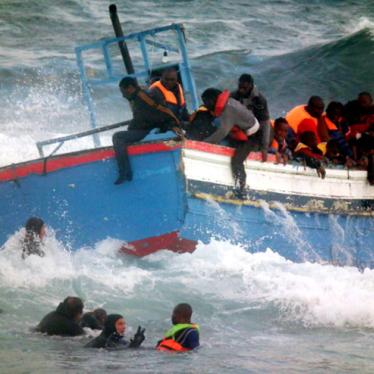(Brussels) - European Union leaders during 2014 were too often willing to sideline human rights at home when expedient in a year marked by success for populist and Eurosceptic parties in European Parliament elections and beyond, Human Rights Watch said today in its World Report 2015. It highlights developments in 10 EU member states, EU human rights foreign policy, and Union-wide developments on migration and asylum, discrimination and intolerance, and counterterrorism.
“Europe is still a place of exclusion, discrimination, and suffering for so many,” said Benjamin Ward, deputy Europe and Central Asia division director at Human Rights Watch. “Until EU leaders are prepared to consistently act in accordance with the Union’s stated values, that picture isn’t going to change.”
In the 656-page world report, its 25th edition, Human Rights Watch reviews human rights practices in more than 90 countries. In his introductory essay, Executive Director Kenneth Roth urges governments to recognize that human rights offer an effective moral guide in turbulent times, and that violating rights can spark or aggravate serious security challenges. The short-term gains of undermining core values of freedom and non-discrimination are rarely worth the long-term price.
The horrific attacks of January 7 to 9 in Paris on the satirical magazine Charlie Hebdo, police officers, and people in a Kosher supermarket that left 17 people dead, heightened concerns about terrorist attacks in Europe as well as new counterterrorism measures that restrict freedom of movement, association, and expression.
The anti-Semitic nature of the supermarket attack, a subsequent wave of Islamophobic violence in France, and ramped-up rhetoric from right-wing parties in a number of EU countries underscored rising intolerance in Europe and its manifestation in violence and discrimination against Muslims, Jews, and other minorities, Human Rights Watch said. A May gun attack at a Jewish museum in Brussels that killed four people was part of a disturbing pattern of anti-Semitic violence and hate speech in the EU in 2014.
The EU Fundamental Rights Agency (FRA) released findings in October that Roma women are disproportionately affected by widespread discrimination, social exclusion, and deprivation experienced by Roma across the EU. In a blow to women’s right to personal autonomy and religious freedom, the European Court of Human Rights in July upheld France’s 2010 ban on the Muslim full-face veil.
The EU’s response to increasing arrivals of migrants and asylum seekers was disappointing, with efforts largely focused on border enforcement and preventing departures. Other EU member states criticized Italy for rescuing tens of thousands of boat migrants in the Mediterranean. Its massive naval operation was replaced by a much more limited operation by the EU external borders agency Frontex at the end of the year. This raises concerns that the death toll in 2015 will surpass the estimated 3,000 people who perished in the Mediterranean in 2014.
The EU is a key humanitarian donor to the Syrian crisis but with the exception of Germany showed little willingness to resettle significant numbers of refugees from Syria. Asylum seekers generally faced significant gaps in protection, including substandard reception conditions in Italy, Greece, France, and Bulgaria, and routine detention of migrants and asylum seekers, including children in some cases. There were reports throughout the year of summary returns and excessive use of force by border guards in Bulgaria, Greece, and Spain.
Ethnic profiling by the police was a serious problem in a number of countries, including France, Greece, and Germany, prompting calls by the FRA and the Council of Europe for greater efforts to combat racism in police forces. Intolerance and violence based on a person’s sexual orientation or gender identity is also common, while people with disabilities face discrimination and obstacles to political participation across Europe.
There was modest progress toward enhanced human rights enforcement within the EU. The European Commission introduced a mechanism to challenge member states over “systemic threats to the rule of law,” and the Council of the European Union endorsed the idea of an internal human rights strategy. The European Commission took legal action against the Czech Republic over its long-standing failure to integrate Roma children in school. But the overall picture remained one of reluctance to act on abusive practices in EU member states, such as Hungary, where independent groups and media freedom are under significant pressure.
A European Court of Human Rights ruling in July that found Poland was complicit in CIA abuse of two terrorism suspects was the one bright spot in lackluster accountability efforts to European complicity in US counterterrorism abuses.







